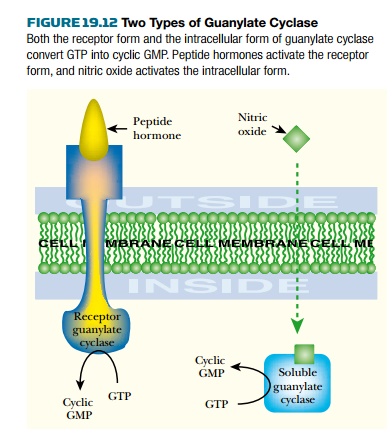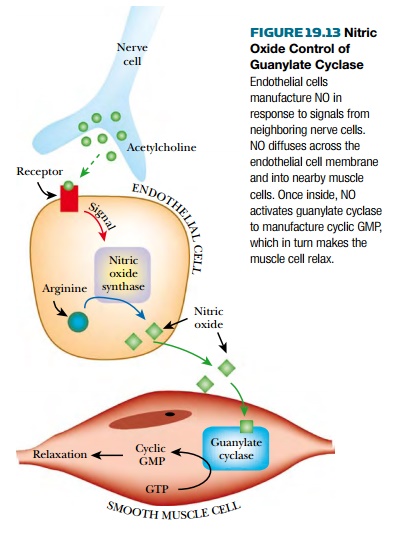Chapter: Biotechnology Applying the Genetic Revolution: Noninfectious Diseases
Nitric Oxide and Cyclic GMP
NITRIC
OXIDE AND CYCLIC GMP
Eukaryotic cells use several other
second messengers. These include cyclic GMP (cGMP) , Ca 2+ ions, inositol
triphosphate, and other products derived from the membrane lipid phosphatidylinositol.
Cyclic GMP is made from GTP by the enzyme guanylate cyclase . There are two
different types of guanylate cyclases. One is membrane bound and also functions
as a receptor for peptide hormones. The other is a soluble protein found in the
cytoplasm that is activated by nitric oxide ( Fig. 19.12 ). Cyclic GMP controls
ion channel opening and closing, and it activates gene expression via protein
kinases. Cyclic GMP-dependent protein kinase is capable of entering the nucleus
where it regulates gene transcription by phosphorylating certain transcription
factors, such as Oct-1.

Nitric oxide is unusual in being a
gaseous signal molecule. Whether it should be regarded as a hormone or a
neurotransmitter is debatable, because its action has characteristics of both
types of signals. Nitric oxide acts via cyclic GMP. Nitric oxide (NO) is
short-lived and is involved in control of a variety of local cellular
activities, including the contraction of blood vessel walls. In response to
nerve cell signals, NO is made from arginine and oxygen by Nom synthase in
endothelial cells and diffuses into nearby muscle cells. Here it binds to a
heme cofactor attached to guanylate cyclase and triggers cGMP production ( Fig.
19.13 ). This leads to muscle relaxation and dilation of blood vessels. (Nitric
oxide at higher levels is toxic and is made as an antibacterial agent by
activated immune cells.)

Related Topics